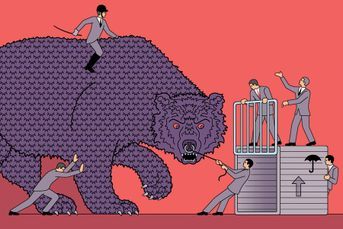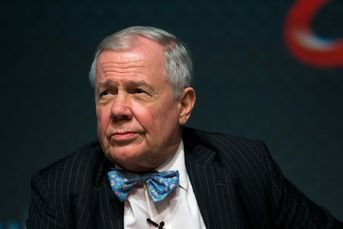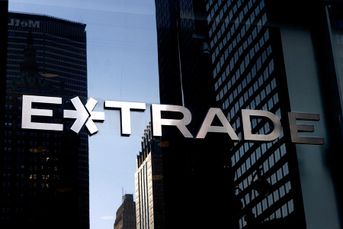2018 outlook in equity investing is mostly bright
Several sectors gain investing thumbs up from five stock market experts.
Most investment strategists think 2018 will go down in history as “not quite as good as 2017.”
And that doesn’t mean it will be a bad year. But in 2017, stocks ran to 20% gains, corporate earnings jumped to record highs, and volatility was as gentle as a newborn foal. Compared to that, most years will look like also-rans.
Leading equity managers are betting on technology, with Fidelity’s Will Danoff telling InvestmentNews why stocks like Facebook and Amazon are in very different positions today than firms like Cisco and Oracle were back in 2000 when their prices were bubbling up.
Robert Doll of Nuveen also projects positive tech vibes, though he is among the experts wondering what will happen in 2018 with inflation — a factor many identify as one of the greatest risks for equities this year.
Our five equity experts also have some thoughts on emerging markets, and Vanguard chief economist Joe Davis offers a two-step approach for investors at the start of this new year.
 JEROME DODSONFounder, chief executive, Parnassus InvestmentsManages $5.8 billion in assets.
JEROME DODSONFounder, chief executive, Parnassus InvestmentsManages $5.8 billion in assets.
John Waggoner: When did you decide to screen companies for how well they treated employees, and why does it work?
Jerome Dodson: What really tipped me off was Milton Moscowitz, who wrote a book in the early 1980s called “The 100 Best Places to Work.” He started writing an annual survey for Fortune magazine. By the late 1990s, I talked to Russell Associates and they said they tracked the 100 best places to work and, of those publicly traded, how their stocks did. It turned out they beat the S&P 500 over 10 years.
That’s a really important part of our philosophy of treating employees well. People work harder; they’re more productive and you have less turnover if you treat them well. It makes sense. You do better as a business.
JW: Morningstar lists Parnassus as a growth fund. Is growth investing superior to value investing?
JD: In the longer term, I agree that value does better. But the last seven or eight years, it has been growth that has done better. I think of myself as a value investor, but journalists say, “He’s a growth investor.” It isn’t really a contradiction.
As I look at it, we can identify certain things that we can identify as value, such as price-to-earnings, price-to-book, price-to-cash flow. It makes sense to use those because you get more value when stocks are low; you get more for the dollar. But we found that some companies are a good value even at a high PE. Now we look at all those ratios on a relative basis: Where has that PE been the past five years? If it has been 19 and we buy it at 16,17, or 18, that’s a good deal. That’s worked really well for us.
JW: Using that basis, is it getting easier or harder to find good value?
JD: It’s driving me crazy. I can’t find much. I don’t want the market to run to cash, but I’m just not finding a lot out there. The fund’s cash level is 8% now; I’d be 99% invested if I could be. I try to buy stocks that are out of favor; so we have a low percentage in technology because it’s selling at such a premium. I’m finding some good values in companies that have had difficulty, such as Qualcomm (QCOM) and Mattel (MAT). But it’s mostly in health care. For example, Gilead Sciences (GILD) — It’s got a very low PE ratio and it’s out of favor, but it has two drugs that are selling well. Its hepatitis C drug sales are declining because the drug is curing people.
 MARK MOBIUSExecutive chairman of Templeton Emerging Markets group, Franklin Templeton Investmentsmanages $29.7 billion in assets.
MARK MOBIUSExecutive chairman of Templeton Emerging Markets group, Franklin Templeton Investmentsmanages $29.7 billion in assets.John Waggoner: Emerging markets have had a tremendous run this year. Is it time for a rest?
Mark Mobius: Stock valuations in some places have gone up, but it’s not a unitary phenomenon. If you’re looking at valuations, such as price-to-earnings ratios, if prices go up and earnings go up more, you’re in good shape. But there’s no question we’re above average in valuations. One big change in the emerging markets is that internet and technology stocks are now a bigger percentage of the MSCI indexes than they are for the U.S. or Japan, thanks to the rise of companies like Alibaba or Tencent Holdings. They have become so big and important, and their stocks tend to be more expensive than those of commodities. So you can find opportunities now in industries like commodities producers.
JW: China is up nearly 45% this year. Is it all tech? Or are there overlooked China sectors?
MM: A lot of it is tech. But there has been a tremendous amount of reform in China in state-owned areas, such as China Aluminum (ACH). It was dead in the water for many years because of overproduction and efficiency problems. Now the company is on fire, with improved prices and rising aluminum prices.
JW: Are there other areas outside of Asia that you like?
MM: I’m happy about Brazil because of the reform movement that resulted from government scandals. The reform movement is an amazing development, unprecedented in Brazil. If they achieve even 10% of what they want to do, that’s a huge accomplishment. They are going whole-hog to reform corporate culture and pay attention to governance. In fact, one of the interesting developments we’re seeing across Latin America is a greater emphasis on ESG (environmental, social and governance). It’s becoming a global phenomenon. International investors, big pension funds, sovereign wealth funds are demanding more attention be paid to these issues, and if the governance is good, stock performance is better.
 ROBERT DOLLSenior portfolio manager, chief equity strategist, Nuveen Asset ManagementManages large-cap equity series of funds that have about $2 billion in assets.
ROBERT DOLLSenior portfolio manager, chief equity strategist, Nuveen Asset ManagementManages large-cap equity series of funds that have about $2 billion in assets.John Waggoner: Is there anything good that’s not priced into this market? If not, do you think earnings will continue to support current levels?
Robert Doll: Everyone knows the good stuff, but a lot don’t believe it — so at least some of the good news is probably not priced in. Everyone understands that earnings are off the charts and that stocks are expensive relative to history (but not bonds). Everyone thinks it will end tomorrow morning,
For stocks to continue to do well, we’ll need good earnings. After this big gain at these valuations, the market has to deliver — but I think it will. If you look at nominal third-quarter GDP, it’s stronger than it has been for 15 years. We’ve got global synchronized growth. Europe is doing better, and Japan is doing better. It’s more green lights: You have to look for yellow. The world’s still pretty good. It had better be, at these prices.
JW: What sector do you think will do best in 2018?
RD: I think tech does just fine — a bit more selective, perhaps. I think earnings growth in tech will continue to be pretty good. Health care came into 2017 cheap with a lot of doubters, but it’s been mostly good news. If I were to pick a sector that was down and out, I’d probably pick telecommunications, which is dirt cheap.
JW: Is inflation dead?
RD: I still scratch my head. I know our Pavlovian reaction is that when unemployment is below 5%, wages go up and inflation goes up; except in this cycle. I’m not sure whether it’s technology, demographics or globalization, but at some point, what we will hear is that companies are having trouble finding good, skilled workers; and we’ll see some wage improvement. One good excuse for not raising wages is that companies can’t raise prices. If they can’t do that, they can’t pay employees more. But at some point, someone is going to want three people who can count to 10 and will only be able to find two, and there will be a bidding war for those people. I’m not looking for big inflation, just a little cyclical uptick for these things to happen.
 JOE DAVISGlobal chief economist, head of investment strategy group, The Vanguard GroupManages global research for the $4.8 trillion fund company.
JOE DAVISGlobal chief economist, head of investment strategy group, The Vanguard GroupManages global research for the $4.8 trillion fund company.John Waggoner: How do you survey the landscape for 2018?
Joe Davis: If I had to hang a phrase on 2018, it’s that risks are brewing. All asset classes are at least fairly valued, if not overvalued. It wouldn’t take much to surprise the markets.
JW: What’s the chief risk?
JD: I think an upturn in inflation — ultimately temporary — is likely, especially in the context of ever-tightening labor markets. That would set us up for tighter monetary policy. Economists are focusing on the economy’s growth rate, not as much on economic slack. We see more and more stories of the deflationary effects of automation, yet fewer on ever-tightening labor shortages.
With unemployment below 4%, wages could rise. Central banks associate rising wages and tighter labor markets with inflation, but our research shows that, given the growing influence of technology, technology is subtracting half a percentage point from inflation a year. If the central banks get a bit more aggressive by the end of next year, it sets up 2019 as a year when rising rates put greater pressure on the equity markets.
JW: What should investors do?
JD: The next five years are going to be a frustrating return environment that will require patience and discipline. It’s unlikely any asset class will be generating meaningful outsized gains. Equities are expected to outperform bonds, but their performance will come down relative to history and the past five years. It’s been a very nice five years. The thing that’s going to move the dial is going back to basics, the laser focus on costs and net-of-cost returns.
There will be a role for low-cost active management and keeping a global mindset on your portfolio. There are few free lunches out there, and it will be more important to harness those free lunches of diversification where you can get it. The first is global exposure to equity. The second is bond diversification for risky portfolios. There’s no other magic bullet. Even though we have the lowest expected returns on balanced portfolios in 10 years, it’s not horrific, but clearly guarded. We said it last year and the year before, we expect returns to come down.
 WILL DANOFFVice president, portfolio manager Fidelity ContrafundManages $124.6 billion fund.
WILL DANOFFVice president, portfolio manager Fidelity ContrafundManages $124.6 billion fund.John Waggoner: Back in 2000, you could have made the same arguments for technology stocks that people are making today: Increased use of chips in everyday things, such as cars; and increased use of the internet for retail and social interaction. What’s different now, and is it sustainable?
Will Danoff: You have an emergence of very large consumer tech companies now. Back then it was Cisco, Oracle, Sun Microsystems — enterprise tech that worked at connecting computers together. Some of the signs that it was bubbling over was service providers going public on a hope and a prayer, buying or leasing gear from Cisco or Oracle. Now you have Amazon (AMZN), offering some exceptional value to its users via its retail business. It’s a big, growing business. In Facebook (FB), you have 1.2 billion daily active users, and they have been able to grow Instagram to half a billion daily active users. Google (GOOGL) is an amazing phenomenon. What’s different is that Facebook and Google are very profitable companies growing at a fast clip. All these companies are very well run — they are not fly-by-night, quick-startup companies.
JW: You have a relatively low weight in international stocks. Why is that?
WD: It is on the low end. What I have found is that — God bless America — the U.S. does capitalism well. An old friend is a CEO of a local company that took over a German company. He said, “I want more innovation and less administration, but this is a German company and it’s harder to cut costs.” We are more dynamic, more open to technology, more open to innovation, and that should accrue to profitable growth.
I am bullish on India. I like areas that are cheap and getting better. India is getting better under the Modi administration. Ryanair (RYAAY) is the best airline in the world. Alibaba (BABA) and Tencent Holdings (TCEHY) are half-billion-dollar companies growing at 45%, 50% a year. Unbelievable.
JW: Any non-tech growth areas you like?
WD: Financials are cheapish and getting better. We’ll see how it goes. With the new administration, there’s a stronger effort to reduce regulatory burden. It’s been excessive in the past 10 years since the crisis. Now they are reducing the excess. You don’t need 10 different regulatory bodies asking for the same information. There should be some streamlining of the processes that will save costs. And they all have too much capital. But loan growth is improving; and if rates go up, we’ll see net interest rates rise.
JW: You’re underweight health care, a traditional growth area. Why?
WD: In a boom-boom economy, it’s not growing as fast as you’d think. The big drug companies have struggled with patent exploration and gotten more competition from biotech. It’s just harder to make money in health care. I’m still looking, trying to dig in and learn the science. It’s been tougher for me; haven’t taken chemistry for 40 years, [but] I’m not giving up.
JW: The fund has suffered redemptions for five years. Does that affect the way you manage it?
WD: I have enough money, $123 billion, so it doesn’t affect me much. The reality is, if money comes in you’re forced to buy. If money goes out, you have to sell. It puts good pressure on you. My own view is that large funds have a higher degree of difficulty. A rational investor would say that rather that investing in Contrafund with $123 billion, you should put a little money with someone who’s managing one-fortieth of that. Investors may say, well, he’s driven a Mack truck and won’t drive us off the road. But over time it wouldn’t surprise me if I continue to get redeemed, because the value proposition is lower than it would be with a smaller fund.
Learn more about reprints and licensing for this article.








